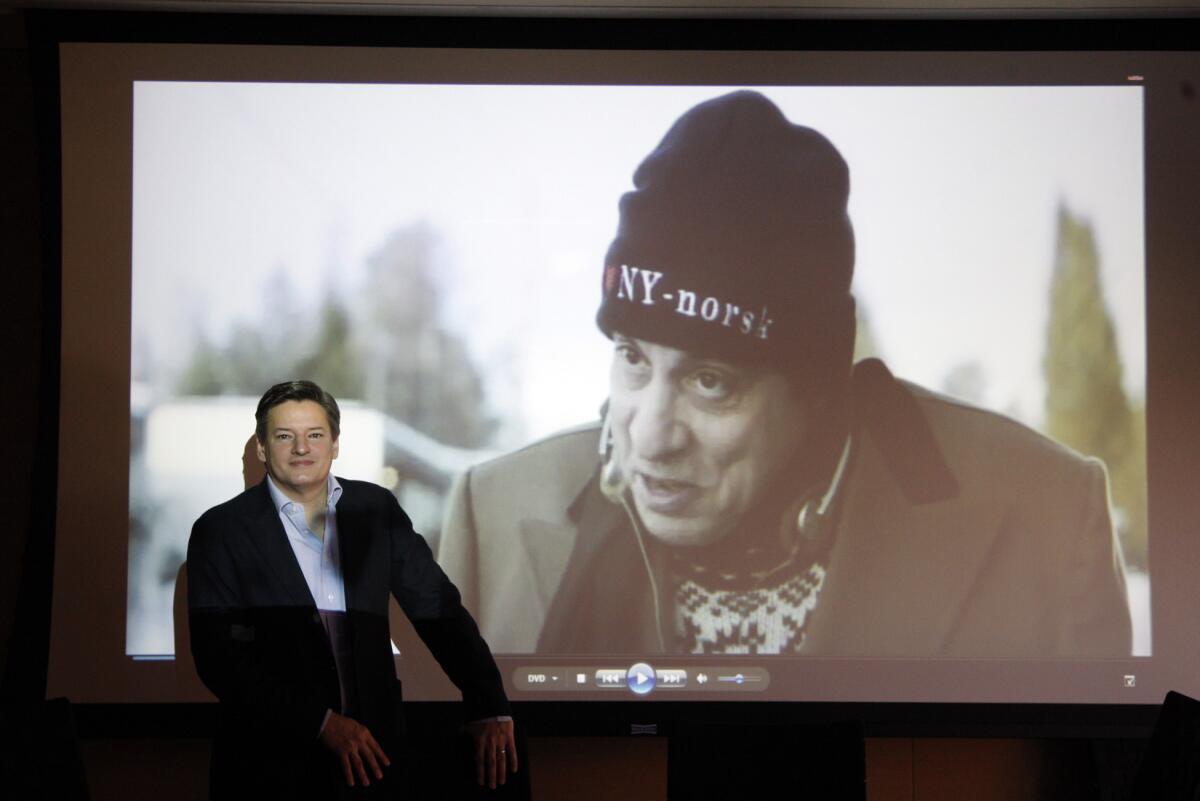Netflix’s Ted Sarandos talks global licensing, sports market and China

Ted Sarandos, chief content officer for Netflix, in his Beverly Hills office on Dec. 15, 2011.
- Share via
In Netflix’s quest to become a global operation, it has an increasing interest in global rights to shows, chief content officer Ted Sarandos said Wednesday at an investor conference.
“More and more what we’re licensing, we’re licensing on a global basis--even though the studios aren’t orchestrated to sell that way yet, my bet is that they will,” Sarandos said at the MoffettNathanson Media & Communications Summit in New York. “And when we go forward and show interest in a show, in some cases it’s, ‘We’re interested in the global rights, or we’re not interested at all.’ That’s one way we try to move the needle over.”
A goal that makes sense given Netflix’s aggressive push at international expansion. About 2.6 million non-U.S. users signed up for Netflix in its first quarter this year, an increase of about 7% from a year earlier and ahead of the forecast of 2.25 million. Netflix expects to add an additional 2 million subscribers during the second quarter as it continues its expansion into Japan and other markets.
Here are nine other takeaways from the conversation:
— On the value of original programming versus acquired content: “For a dollar spent and an hour viewed, you get more hours of viewing per dollar spent on original programming versus licensed content that we’re licensing. The license content is an important part of our strategy and we plan to continue it for a very long time. But, right now, our original programming and success has been much more efficient dollar for dollar”
-- On future of linear TV: “I think what’s going to happen with linear television is it’s going to become more linear. It’s going to become more about events and more about award shows, live sports—all those things that, really, you can’t replicate. Where the attribute is real the live-ness of it, television is fantastic. When the attribute is really the on-demandness—which is really about scripted programming—then Netflix is a great solution for consumers. I think the really saving grace for television is they’ll focus on the other things and make it more event-oriented. They’ll have to figure out the economics of that, for sure, but I think that that’s a natural migration.”
-- On whether Netflix will change the movie model: “We’re premiering a few original films this year. I don’t know that this is the slate of movies that’s going to change the universe or change the trajectory of the business. But I think it’s a step in the right direction, which is premiering the movies on Netflix, doing some simultaneous release in other windows—but not ahead of Netflix—and because Netflix is so well-distributed globally and it’s inexpensive, that it is a good distribution platform for people who want to see a movie. Now, if they want to go to a theater and see “Avengers” … nothing on Netflix can compete with that experience—going out on a date or getting out of the house, seeing it on Imax with rumbling scenes and everything. But if you don’t want to put your shoes on, nothing in that theater can compete with Netflix. It’s really up to the consumer of how they want to watch, when they want to watch, and where they want to watch it.
On getting off-net rights to modern hit sitcoms : “We haven’t been [a bidder]in the past. The market gets really overheated. I think the last ones were ‘The Big Bang Theory’ and ‘Two Broke Girls’ and ‘Mike & Molly.’ What’s happening now is some of those sitcoms are very episodic, so our format isn’t better for them. But on a show like ‘Friends’--and there are other ones, I’m sure, that are on the air right now--work really well because its soft-serialized, but it’s serialized. It’s a better experience to watch that from the first ep of the first season straight through. ‘How I Met Your Mother’ is another show that works beautifully on Netflix. it’s a better experience to watch it on a serialized basis”
On getting into the sports market: “I will never say never, but I would say that where we sit today, I don’t think the on-demandess to sports is enough of an addition to the value proposition to chase. I think the leagues have tremendous leverage to those deals, so it’s not like we’re going to get in and de-leverage the leagues. We’re going to go in and overpay like everyone else does, so it doesn’t get me that excited. Not to say that it wouldn’t someday down the road make sense. Today, i think there is lots of growth in what we’re doing.”
On kids’ programming: “Kids’ viewing is super important to us for a couple of different reasons: We’re trying to program for the household, so there’s something for everyone in the house. There’s something very important and interesting about getting viewing habits from kids while they’re still young, so they’ll come up and that’s the way that they know to watch television.... We want to continue to invest in it. I think it’s important space and I think being able to create brand equity with kids is incredibly valuable. I can’t speak to the TV model to Nickelodeon and others, but for us it’s been an important category.”
On AMC, after its pioneering partnership with Netflix, recently signing an output deal with Hulu: “For us, I don’t think you should read into it. It’s continuing our evolution away from output, more towards curation. So those full output deals—for us, the most valuable content that came from AMC to Netflix, came from Sony and Lionsgate really, because we did ‘Mad Men’ with Lionsgate and ‘Breaking Bad’ and ‘Better Call Saul’ with Sony. So for us, ‘The Walking Dead’ -- a tremendous success on Netflix as well, but to pay for the entire output to get to ‘The Walking Dead,’ I’d rather just pay more for ‘The Walking Dead,’ which leads us up the food chain to dealing more with producers.”
On whether Netflix should view HBO Now as a competitor or a complementary service: “I don’t know to, be honest with you… I really don’t know enough about what their goal is and how they’re going to program the service long-term and how it differentiates from HBOGo at the end of the day.”
On clearing up his previous comments about Netflix breaking into China without local partners: “I was speaking at an event in Shanghai and it was being translated, and the reporter heard the headphones cracking through the whole thing and she couldn’t hear so she took half of my answer which was that our intent is not to go into China without a partner, our intent to try to figure out China and how to get there. It could be with a partner, it could be with production partners. we’re open to all different models to get there eventually because we want to be fully global, and it’s a pretty big chunk of the world to have an asterisk. We’re definitely working on trying to figure out our entry point. From a programming standpoint, their tastes don’t run that much different. We’re looking forward to figuring that out. [But] there’s not much marginal cost to not being in China. It’s not urgent, it’s not an on-fire issue, but as we try to be more global, we want to be part of China too.”
I tweet about TV (and other things) here: @villarrealy
More to Read
From the Oscars to the Emmys.
Get the Envelope newsletter for exclusive awards season coverage, behind-the-scenes stories from the Envelope podcast and columnist Glenn Whipp’s must-read analysis.
You may occasionally receive promotional content from the Los Angeles Times.











